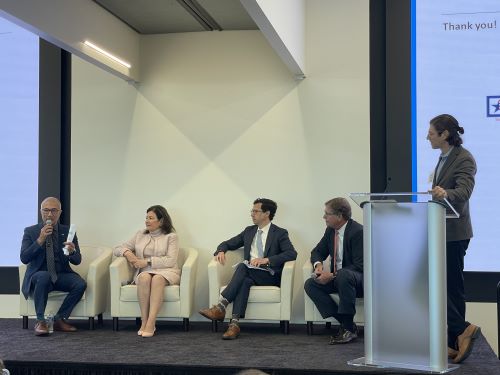Immigration Framework: Let's Hope Congress Listens to the President and The American People
 On January 25th, the White House released a framework on immigration reform and border security outlining what it would like Congress to include in a much-anticipated legislative solution to help deter illegal immigration and legalize undocumented immigrants brought to the country as minors. The framework came in the midst of a three-day government shutdown following the inability of Congress to reach a bipartisan agreement to protect the 700,000 DACA recipients, as the March 5th deadline at which they will begin to lose legal status approaches.
On January 25th, the White House released a framework on immigration reform and border security outlining what it would like Congress to include in a much-anticipated legislative solution to help deter illegal immigration and legalize undocumented immigrants brought to the country as minors. The framework came in the midst of a three-day government shutdown following the inability of Congress to reach a bipartisan agreement to protect the 700,000 DACA recipients, as the March 5th deadline at which they will begin to lose legal status approaches.
The White House’s framework, which asks for funding for border security and a wall, a 10-12 year pathway to citizenship for 1.8 million qualifying undocumented immigrants, stricter requirements for family-based migration, and an elimination and repurposing of the visa lottery program, received disapproving reactions from Democratic and Republican immigration hardliners.
On one side, Democrats that have been demanding a “clean” Dream Act or nothing else are upset because the framework asks for $25 billion to pay for a border wall system, claiming it is a waste of taxpayers’ money. Since when has the Democratic Party been so concerned about limiting government spending? While some Democrats claim the wall is a mean political metaphor, or even that it is racist, many Republicans and especially the President, think a wall on the border is a necessary step to deterring illegal immigration so that this exact situation does not occur again in 10 years. While President Trump certainly has a political motive to follow through with his campaign promise of building the wall, securing the border is a hard thing for Democrats to argue against, especially when it is in exchange for a pathway to citizenship for 1.8 million DREAMers. This is two and a half times the number of undocumented immigrants Obama protected through executive amnesty and Democrats have been asking to legalize.
There has also been outrage from Democrats and some Republicans over the fact that the president wants to limit “chain-migration,” requesting the eligibility requirement for family-sponsored visas to be adjusted to only apply to peoples’ minor children and spouses.
The White House’s framework on immigration was rather vague in some areas, leaving room for Congress to do its job in creating the actual laws. This vagueness has also led to various interpretations of what exact policy the President wants immigration reform to include on the topic of family based migration, which accounts for roughly 65% of new legal immigrants into the US each year.
Many people have jumped to the conclusion that President Trump wants to remove all of those family-based visas without replacing them, claiming things like the White House’s framework “would slash legal immigration rates by 44 percent.” This claim is based on the assumption that the reduced number of immigrants from the cuts in “chain migration” would not be replaced by immigrants getting visas from some form of merit based immigration, which would be detrimental to the US economy and would likely never happen.
President Trump has repeatedly expressed a desire for immigration reform that would create more merit based immigration over family-based immigration. According to a Harvard study, this was also the sentiment of roughly 79% of the American people, when asked whether “immigration priority for those coming to the U.S. should be based on a person’s ability to contribute to America as measured by their education and skills or based on a person having relatives in the U.S.”
The argument on the value of family based immigration vs. merit based immigration is certainly a controversial one, with valid points on both sides. Zuzana Jerabek of the National Immigration Forum points out that "Ethnic communities and families are critical for immigrants by providing them with different types of support that allow them to integrate faster, become employed or start their own businesses. They help newcomers better understand American culture, standards and institutions...Adult children, siblings and parents also play a crucial role in caring for children and family members as they age. Such assistance may allow others in the family to work longer and thus contribute more to the U.S. economy."
A merit based system of immigration would be very complex and require significant research as to what number and skills of immigrants would most aptly meet the dynamic needs of our booming economy. With an aging population demographic and an unemployment rate of 4.1%, the nation needs more workers, but it needs skilled construction and agricultural workers as much as it needs educated doctors and engineers.
On the other side, Republican hardliners on immigration are against any type of “amnesty” for illegal immigrants that would allow them to “cut in line” in front of people currently waiting to be admitted into the US through the current legal immigration system. However, it is a stretch to call the proposed 10-12 year path to earning citizenship amnesty when it would require “clear eligibility requirements to mitigate fraud, and the status is subject to revocation for criminal conduct or public safety and national security concerns, public charge, fraud, etc.” Additionally, the pathway to citizenship would likely have requirements like those included in recent proposals such as requiring that beneficiaries to acquire college degrees, serve in the military, or maintain gainful employment for ~80% of the time they have conditional permanent legal status. The other options, to allow these immigrants to fall back into illegal status, or try to deport them all, would be against the wishes of the majority of the American people and harmful to the American economy.
Multiple sources of data show that the American people support allowing people brought to the country illegally as children to obtain legal status. A recent poll conducted by Fox News found that “overwhelming majorities favor granting work permits (86 percent favor vs. 12 percent oppose) and U.S. citizenship (79-19 percent) to illegal immigrants under the age of 30 brought here as children, provided they pass a background check.”
Congress should pass a bipartisan legislative solution that provides illegal immigrants brought to the country as children with a conditional path to earn legal status and allocates adequate funding to protecting and enforcing the borders to inhibit future illegal immigration. The topic of adjusting family-based migration is much more controversial and complex, and perhaps should be left for a later discussion when the March 5th deadline for DACA recipients and the February 8th deadline for approving government funding are not as pressing.
Democrats need to realize that pointlessly preventing a policy that will secure the border and create a path for the DREAMers to earn citizenship, so they can blame Republicans, will make them look worse than working with the Republicans to pass the legislative solution that Democrats couldn’t when they had the presidency and majority power in Congress. If they don’t, it may become clear that Democrats view DREAMers as political pawns and potential voters, and do not actually care about their best interests. Republican hardliners on immigration need to read the writing on the wall and listen to the voices of the American people. If they do, Republicans could find themselves with about 1.8 million new supporters.








